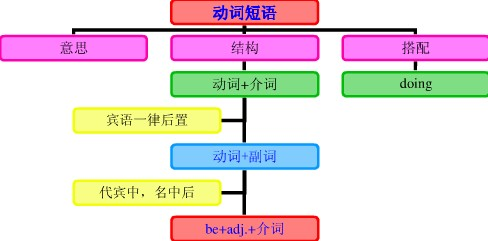本试题 “— Is there a primary school in your village now?— No, but there _____.[ ]A. usedB. didC. used toD. used to be” 主要考查您对系动词
动词短语
等考点的理解。关于这些考点您可以点击下面的选项卡查看详细档案。
- 系动词
- 动词短语
系动词的概念:
连系动词(link verb)是一个表示谓语关系的动词。它必须后接表语(通常为名词或形容词)。连系动词的功能主要是把表语(名词、形容词、某些副词、非谓词、介词短语、从句)和它的主语联系在一起,说明主语的属性、特征或状态。它有自己的但不完全的词义,不能在句中独立作谓语,必须和后面的表语一起构成句子的谓语。它是虚词。
系动词的分类:
1、状态系动词:
用来表示主语状态,只有be一词。
例如:He is a teacher. 他是一名教师。(is与补足语一起说明主语的身份。)
2、持续系动词用来表示主语继续或保持一种状况或态度,主要有keep, rest, remain, stay, lie, stand:
例如:The weather will continue cold and wet.
He remained poor after 20years.
The shop will stay open at 11:00p.m.
He stood/sat silent there.
3、表像系动词:
用来表示"看起来像"这一概念,主要有seem, appear, look。
例如:She appears to have know this thing.
She seems a student.
4、感官系动词:
感官系动词主要有feel, smell, sound, taste。
例如:The silk feels soft.
Your idea sounds a good one.
He looked like his mother.
The mixture tasted terrible.
The flower smells sweet.
5、变化系动词:
这些系动词表示主语变成什么样,变化系动词主要有become, grow, turn, fall, get, go, come, run。
例如:My dream o fcoming to China has come true.
In summer food often goes bad.
He turned doctor./ He became a doctor.
He fell asleep as soon as he went to bed.
6、终止系动词表示主语已终止动作,主要有prove, turn out,表达"证实","变成"之意。
例如:The truth he stuck to proved true.
系动词基本用法:
连系动词是表示不完全谓语关系的动词,它与其后的表语一起构成谓语。
常见的连系动词有be(是),become(成为),get(变成),remain(还是),seem(似乎是),look(看上去),feel(感觉)等。
连系动词后的表语通常是名词和形容词,有时也可以是代词、数词、副词、介词短语、不定式、动名词、从句等:
如:His English is excellent. 他的英语很棒。(跟形容词)
He is a famous poet. 他是著名诗人。(跟名词)
Money isn't everything. 金钱不是一切。(跟代词)
She was the first to arrive. 她是第一个到达的人。(跟数词)
Who is up stairs? 谁在楼上?(跟副词)
He is with his friends. 他和朋友在一起。(跟介词短语)
He seems to be ill.他似乎病了。(跟不定式)
Seeing is believing. 眼见为实。(跟动名词)
This is what you need. 这就是你需要的。(跟从句)
注:有些系动词又是实义动词,该动词表达实义时,有词义,可单独作谓语。
例如:1、She tasted①the soup to see if it tasted②too salty. 她尝了一口汤,看是否太咸。
2、The doctor is feeling①his pulse because he feels②sick. 因为身体不舒服,医生正在给他切脉。
3、The mother looked①at the sick child sadly and she looked②sad. 母亲难过地看着生病的孩子。
4、She smelled①the meat to make sure it still smelled②good. 她闻了闻肉,看看是否还新鲜。
5、The teacher asked the students to keep②quite when they were keeping①everything in order. 当学生整理东西时,老师让他们保持安静。
从以例子不难出,标①的动词为实义动词,他们后跟有宾语;标②的动词为系动词,其后往往跟形容词、名词、不定式等作表语。
系动词知识体系:

连系动词使用应注意的两点:
1、关于连系动词后接副词作表语:
连系动词后通常可接形容词作表语,一般不接副词:
误:His English is very well. 他的英语很好。(应将well改为good)
误:Be carefully. 小心点。(应将carefully改为careful)
误:The soup tastes nicely. 这汤味道不错。(应将nicely改为nice)
但是,有时连系动词后也可接副词作表语,不过这主要限于in, on, off, out, away, behind, up, down, over, through, around, round, below, inside, outside等少数副词小品词以及here, there, upstairs, downstairs等少数表示地点或方位的副词:
如:Mother wasn't in last night. 母亲昨晚不在家。
The meeting was over at five. 会议五点结束。
Come along. The taxi is outside. 来吧,出租车在外面。
Mother is downstairs waiting for you. 母亲在楼下等你。
2、关于连系动词后接不定式:
(1)连系动词be后根据情况可自由地接不定式作表语:
如:My dream is to be a scientist. 我的梦想是当一名科学家。
All I could do was to wait. 我只能等。
My plan was to go from London to Paris. 我计划从伦敦去巴黎。
I was to have seen Mr Kay. 我本要去见凯先生的。
(2)seem, appear, prove, continue, turn out, get, grow, come等连系动词后也可接不定式(尤其是to be)作表语:
如:She always seems to be sad. 她常常显得很忧伤。
My advice proved to be wrong. 我的意见证明是错的。
She appears to have many friends. 他好像有很多朋友。
The weather turned out to be fine. 天气结果很好。
Circumstances continue to be favorable. 情况仍然是有利的。
He has grown to like studying English. 他渐渐喜欢学英语了。
【注】
若所接不定式为to be,通常可以省略。不过,若其后接的是表语形容词,则to be通常不宜省略。
另外,连系动词look后能否接tobe似乎尚有争论,不过,在现代英语中接to be的现象已较普遍。
(3)sound, smell, feel, taste, become等连系动词后通常不能接不定式:
误:These oranges taste to be good. (应去掉to be)
误:The roses smell to be nice.(应去掉to be)
(4)有的连系动词后接的从句可用不定式来改写:
如:It seems that she's right./ She seems to be right. 她似乎是对的。
It appears that you have made a mistake./You appear to have made a mistake. 似乎你弄错了。
动词短语的概念:
动词常和某些其他词类用在一起,构成固定词组,形成所谓短语动词(phrasalverb)。和动词一样,短语动词也可分为及物和不及物两种。短语动词可以作为一个整体看待,同一般动词一样使用。
动词短语的搭配类型:
1)动词+介词:这类短语动词用作及物动词,后面须跟宾语。
如:The small boy insisted on going with his parents. 那男孩坚持要跟父母一起去。
Do you often listen to broadcasts in English? 你常听英语广播吗?
Look at the children. Aren't they lovely? 看着这些孩子们。他们多么可爱呀!
We stand for self-reliance. 我们是主张自力更生的。
这一类的短语动词还有很多,如depend on(upon)(依靠),wait on(服侍),look for(寻找),deal with(对待),look after(照料),wait for(等待)等。
2)动词+副词:
这类短语动词有的用作及物动词,有的用作不及物动词。
如:I always get up as soon as the bell rings. 我总是一打铃就起床。(不及物)
Look out, there's a car coming! 当心,来汽车了!(不及物)
Have you handed in your exercises already? 你已经交练习了吗?(及物)
Please don't forget to put on your coat, it's cold outside. 请不要忘记穿外衣,外面很冷。(及物)
这一类的短语动词还有很多,及物如put out(扑灭),eat up(吃光),put down(放下);不及物如set off(出发),come up(走近),go on(继续)。
注:"动词+副词"这类短语动词和上面第一类"动词+介词"的不同之处在于:"动词+介词"用作及物动词,后面须跟宾语。"动词+副词"则有的及物,有的不及物;用作及物动词而宾语为人称代词或自身代词时,副词往往放在宾语之后。
如:Please wake me up at five tomorrow. 请在明天早上五点唤醒我。
If you have done your exercises, please hand them in. 如果你们练习做完了请交来。
She doesn't normally behave like that, she's putting it on. 她通常并不如此表现,她是装出来的。
注:这类短语动词有不少可兼作及物和不及物动词用。
如:He took off his hat when he entered the office. 他进办公室后脱下帽子。(及物)
The plane took off at seven sharp. 飞机在七点整起飞。(不及物)
Charlie rang up Neil to ask about the time of the meeting. 查理打电话给尼尔问开会的时间。(及物)
If you can't come, please ring up and let us know. 你如来不了,请来电话告诉我们一声。(不及物)
3)动词+副词+介词:
"动词+副词"之后有的可以再加一个介词,形成另一种短语动词。这类短语动词用作及物动词。
如:Do not give up hope. We must go on with the experiment 不要失望。我们必须继续试验。(go on with继续)
He came up to me. 他走到我跟前。(come up to走近)
这类短语动词还有:look down upon(看不起),do away with(去掉),put up with(忍受)等。
4)动词+名词+介词:
这类短语动词也是及物的。
如:He shook hands with all the guests at the banquet. 他在宴会上和宾客一一握手。
Young pioneers often come to the Children's Palace to take part in after school activities.少先队员经常到少年宫来参加课外活动。
Pay attention to the temperature of the stored rice. 注意仓库里的稻谷的温度。
Her job is taking care of the babies. 她的工作是照顾婴儿。
这一类短语动词还有:put an end to(结束),take notice of(注意),catch hold of(抓住),lose sight of(看不见),make use of(利用)等。
动词短语知识体系:

与“— Is there a primary school in your village now?— No, but...”考查相似的试题有:
- I wonder if your brother likes to play football. If he does, so _______ mine.A.isB.doC.doesD.will
- ______ by the doctor’s words, he made up his mind to fight against his cancer.A.ForcedB.AmazedC.InspiredD.Ordered
- My parents ____in 1956, they _____for 20 years.A.married, marriedB.married, have got married.C.got married, have b...
- My little brother _____ great delight _____ studying ancient architecture .[ ]A. picks; inB. devotes; toC. takes; inD...
- Whenever possible, Mr Smith how well he speaks Spanish.A.shows upB.shows aroundC.shows offD.shows out
- Who says cats and dogs can’t well? My dog acts as the eyes of my blind cat.A.go onB.get throughC.go overD.get along
- ---Have you _____ completing the work given by your boss?---Not yet, though I have tried to.A.devoted toB.succeeded...
- He ______ his friend the moment he got the good news.A contacted with B contacted C kept in contact with D noticed
- We should always remember the soldiers who _____ for the revolution of China.A.bloodB.bleededC.bleedD.bled
- — He seems to be lost in thought. Why?— Because the film _____his memories of his childhood.A.calls upB.picks upC....